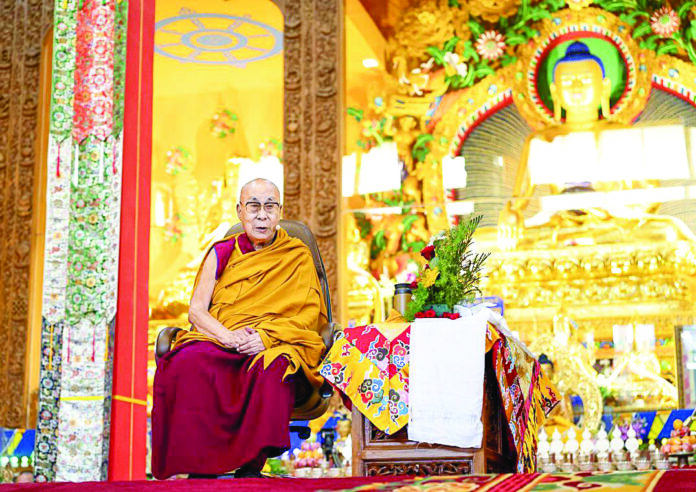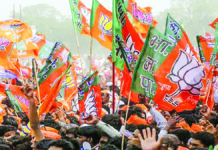NEW DELHI: This is a crucial year for Tibetans and is also marked by a couple of anniversaries important for the Communist Chinese regime. Last week the XIVth Dalai Lama set at rest all speculation when he confirmed that the institution of the Dalai Lama shall continue. An announcement regarding reincarnation is also expected by his 90th birthday on 6th July. Earlier, in his recent book, “Voice of the Voiceless”, the Dalai Lama had hinted that he would be reincarnated. The Chinese have tried hard to avoid a situation of “two Dalai Lamas”.
In 2007, China enacted regulations asserting the Chinese government’s authority in recognizing Tibetan Buddhist tulkus (reincarnate lamas) and stipulating that highranking incarnations must be selected using a specific process, including the “Golden Urn” lottery system.
The regulations also state that reincarnations must be born within China and that no foreign organization or individual can interfere in the selection. However, with the XIVth Dalai Lama’s latest assertion, the stage is now virtually set for two Dalai Lamas—one decided by the XIVth Dalai Lama and the other propped by Beijing.
The Chinese authorities are also finalising plans for celebrating the 60th anniversary of the formation of the Tibet Autonomous Region (TAR) and 75th anniversary of the so-called “peaceful liberation” of Tibet this September. Reports indicate that Xi Jinping will probably visit Tibet to take part in these celebrations. His visit will raise the profile of the celebrations and considerably heighten the already restrictive security controls imposed on Tibetans across the TAR and in adjoining areas.
The Chinaappointed Panchen Lama, Gyaltsen Norbu is likely to accompany Xi Jinping on his visit to Tibet. This will be intended to raise his profile in preparation for his role in recognising the XIVth Dalai Lama’s reincarnation and later being the reincarnate’s principal Tutor. Meanwhile, the Chinaappointed Panchen Lama, Gyaltsen Norbu, who met Chinese President Xi Jinping and the three most senior officials dealing with Tibet in Beijing on 5 June, arrived in Lhasa on 27 June.
At the meeting in Beijing, Xi Jinping had asked him to study hard to become proficient in Tibetan Buddhist scriptures, urge Tibetan Buddhist monks to promote the “sense of Chinese community”, nationalism and patriotism, and accelerate the adapting of Tibetan Buddhism to socialism with Chinese characteristics. Gyaltsen Norbu can be expected to lend his voice to this effort and exhort and motivate the monks and Tibetan people.
Chinese President Xi Jinping’s interest in Tibet has been visible ever since he was appointed Vice President of China. In fact since even earlier, if one recalls that his mother is a practicing Buddhist and that as Party Secretary of Zhejiang province he successfully organised China’s First World Buddhist Forum in 2001.
Since his appointment as Vice President, Xi Jinping has visited TAR thrice and on each occasion travelled to the sensitive Nyingchi Prefecture. Nyingchi Prefecture’s administrative boundaries, as per Beijing’s official maps, reflect Chinese claims and include virtually the entire Indian state of Arunachal Pradesh. It is also where China is building the world’s largest dam on the Brahmaputra (Yarlung Tsangpo in Tibetan) in Tibet’s Medog county where the river flows into India’s Arunachal Pradesh at the Great Bend and then flows on into Bangladesh. China’s leaders and official media consistently highlight that Nyingchi is an important border Prefecture that guards China’s southwest frontiers.
Appearing to reinforce these statements at least half a dozen articles by official organisations have been spotted on China’s social media. The articles focus solely on the forces deployed in Tibet. They highlight that the “Tibetan forces” are among the People’s Liberation Army’s (PLA’s) finest and toughest troops and had proved themselves in the recent clashes with Indian troops including at Galwan.
At least one article stated that troops deployed on the Tibetan Plateau receive higher salaries and allowances than others. Viewed together with the continuing deployment of Chinese troops in Ladakh and along the border and reports of new military formations, the implication of these articles and Xi Jinping’s visits are clear—they are an assertion of Chinese territorial claims on India. The period after the XIVth Dalai Lama will be tense.
The age of the reincarnate Dalai Lama will create its own vulnerabilities. The Chinese will step up efforts to create dissension and divisions among the Tibetan Buddhists in exile. While the monks in Dharamshala are in the process of finding the reincarnation, it can be anticipated that attempts to disrupt their efforts would be made as the Chinese authorities independently make efforts to identify and install a Dalai Lama of their choice.
The United States Congress, through the Tibet Resolve Act, has already stated that the Dalai Lama alone can decide on his reincarnation and where he will be born. Sensitive to the sentiments of the nearly 7 million Tibetans inside China, Beijing will, however, seek to pressurise its neighbours and the other Buddhist nations in the region to endorse Beijing’s choice. The Tibetans though, will accept the reincarnation indicated by the Dalai Lama.
The author is President of the Centre for China Analysis and Strategy.








